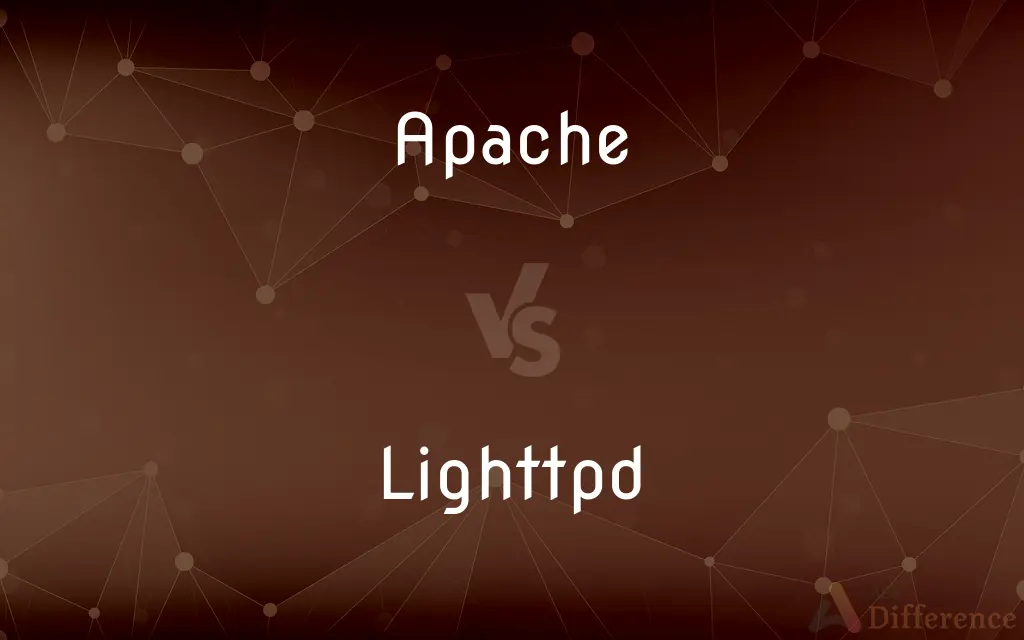Apache vs. Lighttpd — What's the Difference?
By Tayyaba Rehman & Maham Liaqat — Published on September 11, 2024
Apache is a widely-used, feature-rich web server known for its flexibility and modularity, while Lighttpd is known for its speed and efficiency, especially in serving static content.

Difference Between Apache and Lighttpd
Table of Contents
ADVERTISEMENT
Key Differences
Apache has been the most popular web server on the Internet since the mid-1990s. It is known for its powerful features, extensive module system, and flexibility, allowing it to host everything from small to very large websites. On the other hand, Lighttpd, pronounced "lighty," is designed to be lightweight and efficient, excelling in serving static content and managing high traffic loads while consuming fewer resources than Apache.
While Apache offers a wide range of modules for various functionalities like server-side programming languages, authentication, and SSL encryption, making it highly customizable, Lighttpd focuses on speed and efficiency. Lighttpd achieves this through an event-driven architecture that minimizes CPU load under high demand, whereas Apache's process-driven or thread-driven models can consume more resources.
Apache's configuration system is extensive and allows detailed customization of server behavior, which suits complex hosting environments. Lighttpd, while also flexible, has a simpler configuration that can be easier to manage for straightforward serving tasks. This makes Lighttpd a preferred choice for serving static websites or as a backend for content distribution networks.
The performance of Apache vs. Lighttpd often comes down to the specific needs of the web application. Apache's architecture allows it to serve a wide variety of content types efficiently but can be slower under heavy loads compared to Lighttpd. Conversely, Lighttpd's lightweight design offers faster response times for static content and can handle a large number of simultaneous connections without significant resource consumption.
Both web servers support running dynamic content through external applications and interpreters for languages like PHP, but they do so in different ways. Apache integrates this support more deeply through its module system, while Lighttpd typically relies on FastCGI or SCGI protocols to communicate with external processors, reflecting its focus on simplicity and speed.
ADVERTISEMENT
Comparison Chart
Main Features
Highly customizable, extensive module system
Lightweight, efficient, fast response times
Design Philosophy
Flexibility and modularity, suits complex configurations
Speed and efficiency, minimal resource use
Performance
Can be resource-intensive under heavy loads
Handles high traffic with minimal CPU load
Configuration
Detailed and extensive
Simpler and easier to manage
Best Used For
Wide range of web applications, from small to large websites
Serving static content, high-traffic websites with efficiency
Dynamic Content Support
Deep integration via modules
Relies on FastCGI/SCGI for external processing
Resource Consumption
Higher, depending on configuration and load
Lower, designed to be resource-efficient
Architecture
Process-driven or thread-driven
Event-driven
Compare with Definitions
Apache
Highly customizable web server.
Apache can be configured to support complex web applications with various modules.
Lighttpd
Simple configuration.
Lighttpd's configuration is straightforward, making it easy to manage.
Apache
Suited for complex hosting environments.
Its extensive configuration options make Apache ideal for hosting diverse web applications.
Lighttpd
Designed for speed and efficiency.
Lighttpd serves static content quickly and with minimal resource usage.
Apache
Dominant web server.
Apache has been the most popular web server for decades due to its robust features.
Lighttpd
Lightweight web server.
Lighttpd's event-driven architecture allows it to handle high traffic efficiently.
Apache
Supports a wide range of modules.
Apache modules extend its functionality to include server-side programming, authentication, and encryption.
Lighttpd
Excellent for static websites.
Lighttpd is often chosen for serving static content due to its fast response times.
Apache
Can be resource-intensive.
Apache might consume more resources under heavy load compared to more lightweight servers.
Lighttpd
Handles simultaneous connections well.
Lighttpd can manage a large number of connections without significant resource consumption.
Common Curiosities
How does Apache handle dynamic content?
Apache handles dynamic content through integrated modules or by interfacing with external processors via protocols like CGI, FastCGI, or mod_php for PHP content.
Can Apache and Lighttpd be used together?
Yes, Apache and Lighttpd can be used together in a web architecture where Apache handles certain requests or applications, and Lighttpd serves static content or manages high traffic loads to optimize resource use and response times.
What is Apache?
Apache is a widely-used, open-source web server software known for its flexibility, power, and extensive feature set, suitable for hosting a variety of web applications.
What kind of websites benefit most from Lighttpd?
Websites that serve a large amount of static content or experience high traffic volumes benefit most from Lighttpd due to its efficiency and ability to handle numerous connections with minimal resource consumption.
How does Lighttpd serve dynamic content?
Lighttpd serves dynamic content primarily by interfacing with external processors through the FastCGI, SCGI, or CGI protocols, focusing on maintaining its lightweight and efficient architecture.
Is Apache or Lighttpd easier to configure?
Lighttpd is often considered easier to configure due to its simpler configuration syntax, although Apache's extensive documentation and community support can mitigate its complexity.
What is Lighttpd?
Lighttpd is an open-source web server designed for speed and efficiency, particularly effective in serving static content and handling high traffic volumes with minimal resource use.
Which web server uses more resources?
Apache can use more resources, especially under heavy loads, due to its process-driven or thread-driven architecture, compared to Lighttpd's more resource-efficient event-driven design.
Can Lighttpd replace Apache?
Lighttpd can replace Apache in scenarios where efficiency and handling high volumes of traffic are priorities, particularly for serving static content. However, Apache may be preferred for complex applications due to its modularity and extensive feature set.
Can Apache and Lighttpd run on the same server?
Yes, they can run on the same server but on different ports or serving different content or applications as part of a larger web infrastructure to leverage their respective strengths.
Which web server is better for a new website?
The choice depends on the specific needs of the website. Lighttpd might be better for simple, high-traffic sites prioritizing efficiency, while Apache's flexibility and extensive features suit complex applications.
Which is faster, Apache or Lighttpd?
Lighttpd is generally faster, especially when serving static content or handling a large number of simultaneous connections, due to its event-driven architecture.
How do Apache and Lighttpd handle security?
Both Apache and Lighttpd have mechanisms and modules for handling security concerns like authentication, access control, and encrypted connections. Ongoing maintenance and updates are crucial for both servers to address security vulnerabilities.
Does Lighttpd support SSL/TLS encryption?
Yes, Lighttpd supports SSL/TLS encryption, allowing for secure communications between the web server and clients.
Why is Apache so popular?
Apache's popularity stems from its robust feature set, flexibility, extensive module system, and strong community support, making it suitable for a wide range of web hosting needs.
Share Your Discovery

Previous Comparison
Beard Balm vs. Beard Butter
Next Comparison
Aluminum Wheels vs. Alloy WheelsAuthor Spotlight
Written by
Tayyaba RehmanTayyaba Rehman is a distinguished writer, currently serving as a primary contributor to askdifference.com. As a researcher in semantics and etymology, Tayyaba's passion for the complexity of languages and their distinctions has found a perfect home on the platform. Tayyaba delves into the intricacies of language, distinguishing between commonly confused words and phrases, thereby providing clarity for readers worldwide.
Co-written by
Maham Liaqat











































